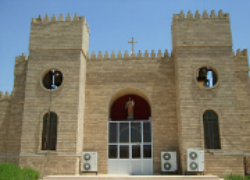
/kurdistanchurchSL%20James.jpg
The Kurdish parliament is considering a bill that would criminalize offending and insulting religions in response to the arrest of Hamin Ary, the editor of an Erbil-based Kurdish monthly magazine. Ary was arrested in May for “violating religious sensibilities” after he republished a controversial article entitled “Me and God.” The article, originally published on Facebook in 2010, imagines a fictional conversation between its author and God. Local imams and government officials in Kurdistan consider the piece blasphemous and insulting to Islam.
Following Ary’s arrest, as many as 2,000 people protested in the streets of Erbil and demanded the death of the article’s original author. Members of the Kurdish parliament responded by proposing a bill tentatively entitled “The Draft Law” to protect sanctities. The legislation would criminalize “swearing at and mocking God” and “swearing at, mocking, insulting and portraying prophets inappropriately,” and would punish offenders with up to ten years in prison and fines up to $40,000. Proponents of the law argue that it will protect religion from offensive acts and will apply to all religions equally, including minority religions that have existed in the Kurdistan area for ages.
Kurdistan is a semi-autonomous region in northeastern Iraq that is governed by the Kurdistan Regional Government (KRG), a body with the authority to enact its own laws independent of the Iraqi government. Due to violence and persecution directed at religious minority groups in Iraq, tens of thousands of individuals belonging to minority religions have sought refuge in Kurdistan. These groups include Yezidis, a distinct ethnic group targeted for persecution because of the belief among many Muslims that they are devil worshipers; Baha’is, whose faith Iraq officially banned until 2007; Shabaks, an ethnic group that practices either Shi’a or Sunni Islam; and Chaldean, Assyrian, and Syriac Christians. Though these minorities have experienced comparative freedom and safety in Kurdistan, blasphemy laws have more frequently been used to squash minority religious viewpoints and political dissent than to protect the sanctity of religions and the lives of the devout.
Countries with some of the worst human rights records vigorously enforce their own version of blasphemy laws. For example, on August 16 in Pakistan, a Christian girl no older than fourteen was arrested under the country’s blasphemy laws. The girl, Rimsha Masih, was accused of burning pages of the Qu’ran, a crime punishable by death. In September Masih was released from prison on bail after it was discovered that a Pakistani mullah deliberately framed her. Although the case against her has not been entirely dropped, Masih is fortunate compared to the thousands of others around the world accused of blasphemous acts. In Saudi Arabia, Nigeria, Indonesia and other countries around the world, political reformers, religious leaders advocating alternative theological interpretations, and members of minority faiths are imprisoned, beaten, and murdered for their actions and beliefs.
As Kurdish parliamentarians draft their blasphemy bill, their challenge will be to ensure that the law serves to protect the rights of religious freedom and freedom of speech for everyone in Kurdistan. While the KRG must protect its citizens, blasphemy laws tend to offer protection at the expense of liberty, a trade off that should not be accepted in Kurdistan.
Bryan Neihart is a 2L and a staff editor on the Denver Journal of International Law and Policy.


